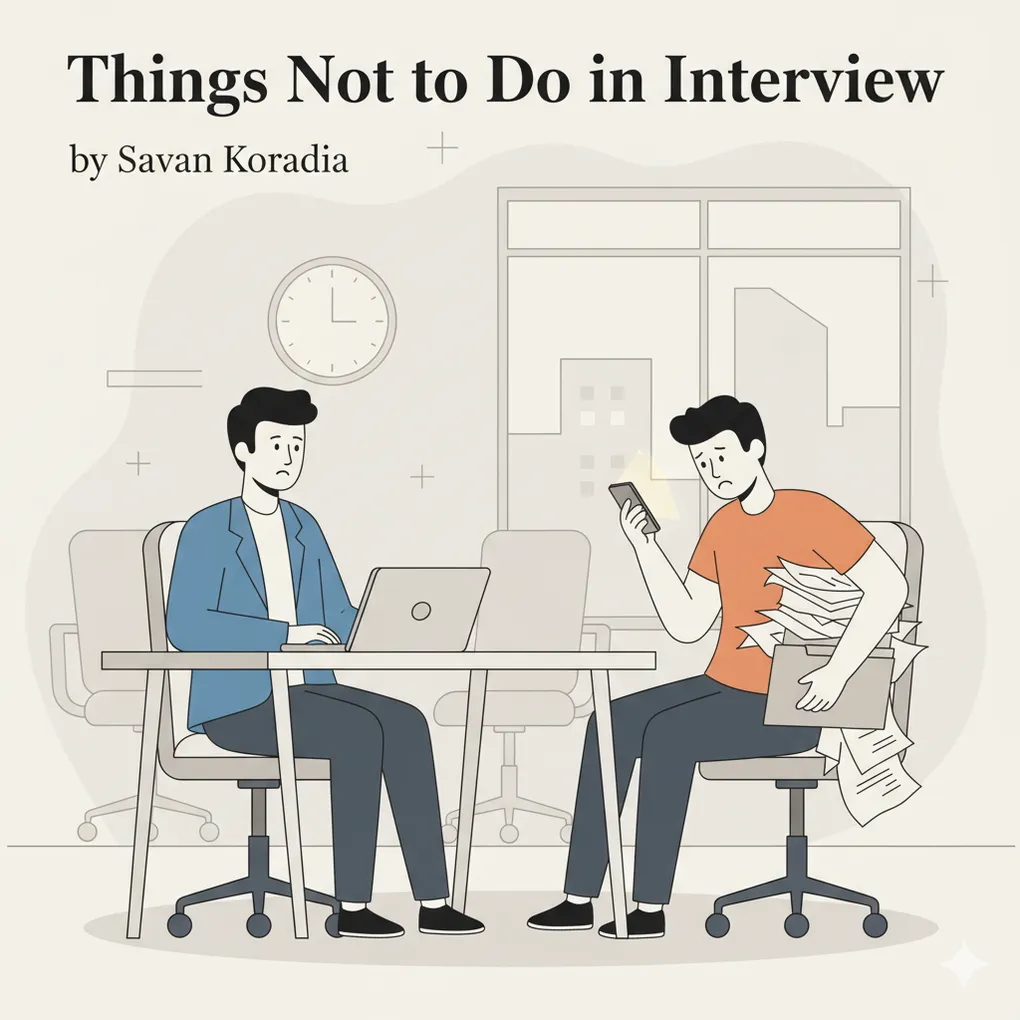
Things Not to Do in Interview
Interview is an important part of getting a new job, but there are a few traits found in some candidates that are not a good sign in an interview.
I have conducted many interviews where I have noticed behaviors explained below.
Not Appearing On Time
When any HR person calls a candidate about scheduling the interview, some candidates just agree to it without even thinking about their current job workload.
And when the time comes, they are simply not available. Most of the time, the candidate won’t even pick up the phone, and once they do, they offer excuses.
This happens frequently and gives a bad impression.
What You Should Do:
Check your own timetable twice before confirming the interview schedule.
Once confirmed, if there is any change, call the recruiter to reschedule and give a valid reason.
Wrong Information in Resume
I have noticed a few times that candidates provide false information about their experience or technical knowledge.
Based on the resume, as an interviewer, I will have higher expectations — and all the truth comes out during the interview when the candidate cannot answer relevant questions.
What You Should Do:
Write only what is correct.
If you have only read about a feature or technology, don’t add it to your resume as actual experience.
If the interviewer asks something you don’t know, it’s better to politely say “No” rather than try to fake it and look foolish.
Not Checking About Company and Work
Every company has a different environment, technology stack, and type of projects.
There is a high possibility that another company may not provide the same experience as your current one.
I have seen some friends sending resumes to every company they find, without checking what that company actually does or works on.
The real issue appears when they are in the interview and realize the company doesn’t work in the technology they are interested in.
For example, I have seen candidates confusing Salesforce Commerce Cloud with other Salesforce platforms.
What You Should Do:
Remember that there is a difference between every platform — even if owned by the same company.
Read the job description twice and confirm details with the recruiter if you still have questions.
Overconfident
Some candidates show a high level of confidence even when they have little to no experience.
This often relates to providing false information on the resume. They try to oversell their knowledge.
For instance, one candidate told me I could ask him anything about a technology, but he had no idea about its basic concepts. This kind of attitude hurts your evaluation.
What You Should Do:
Don’t oversell your experience.
The interviewer will eventually find out your actual skill level.
Always tell the truth — if you don’t know something, politely deny rather than pretend and look unprepared.
Unrelated and Not Satisfactory Answers
I once met a candidate in an online interview who gave short and irrelevant answers.
For example, I asked how promotions are set up in SFCC, and he replied, “It works because I saw it worked on my computer.”
When asked for more details, he repeated the same thing.
Another time, I asked about content assets in SFCC, and he started explaining content slots instead — which are completely different.
What You Should Do:
Take a pause and think about the question twice.
If you are unsure, ask the interviewer to repeat or clarify it before answering.
Buying Time in the Wrong Way
Sometimes, I notice candidates trying to buy time before answering by pretending there’s a voice or internet issue.
Once, a candidate even forgot to mute their mic and was heard asking someone else for help!
In another case, a candidate started typing on the computer to search for an answer after admitting they didn’t know — and then magically gave a full, polished answer a few seconds later.
What You Should Do:
Take a pause and mention that you need a few seconds or a minute to think.
If you have no answer, it’s fine to pass.
Prepare well before the interview so you can answer confidently without unnecessary delays.
Conclusion
The behaviors mentioned above will negatively affect your evaluation if you continue doing them.
Try to improve by following the “What You Should Do” sections after each point.
If you are an interviewer, feel free to comment if you have seen such scenarios.